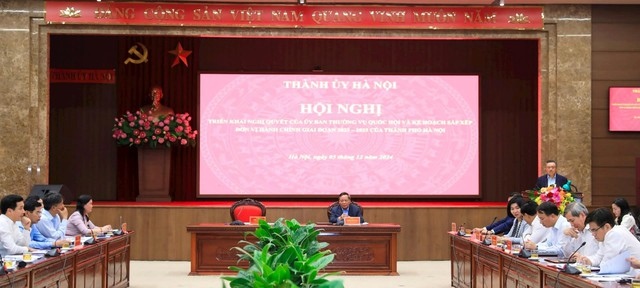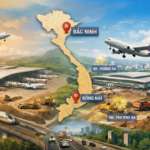On the afternoon of the 5th of December, the Hanoi Party Committee organized a conference to deploy the Resolution of the National Assembly’s Standing Committee and the city’s plan for the arrangement of administrative units for the period of 2023-2025.
At the conference, Director of the Department of Home Affairs Tran Dinh Canh promulgated Resolution No. 1286 of the National Assembly’s Standing Committee on the arrangement of the city’s communal-level administrative units for the period of 2023-2025, which will take effect from January 1, 2025. The Resolution stipulates the arrangement of 109 communal-level administrative units to form 56 new communal-level administrative units in 20 districts, counties, and towns of Hanoi.
From the effective date of the Resolution, Hanoi will have 30 district-level administrative units, including: 17 rural districts, 12 urban districts, and 1 town. There will be a total of 526 commune-ward-township level administrative units, comprising: 345 communes, 160 wards, and 21 townships (with no change in the number of district-level units and a reduction of 53 commune-ward-township level units compared to the present).
Regarding finance and public assets in the implementation of administrative unit arrangement, Director of the Department of Finance Nguyen Xuan Luu stated that out of the 109 commune-level office buildings subject to arrangement, according to the proposed handling method of the districts, counties, and towns, 99 office buildings will be retained for continued use as offices of the new administrative units or converted into community houses, village cultural houses, or ward-level cultural houses, to be managed by the People’s Committees of the new administrative units. Six office buildings will be transferred to other agencies for use as schools or public security offices, and four office buildings will be transferred to the district-level People’s Committees.
Director of the Department of Finance also emphasized that no fees of any kind will be collected when citizens apply for document changes related to the administrative unit arrangement, in accordance with the Resolution of the National Assembly’s Standing Committee.
Regarding residence management and updating citizen information in the national database, Director of the Hanoi Public Security, Lieutenant General Nguyen Hai Trung, assured that citizen information will be transferred to the new administrative units in both digital and physical formats.
Providing clarification on personnel matters in administrative units undergoing arrangement, Director Tran Dinh Canh of the Department of Home Affairs shared that the department will provide guidance on transferring commune-level officials and civil servants to state civil servants. For leaders and heads of units, he requested that localities prioritize salary and rank arrangements for Party officials so that decisions can be made before December 31. If these officials are later assigned deputy positions, they will still be considered civil servants.
Regarding personnel transfers from wards to districts or from districts to units of a different nature, Mr. Canh stated that transfers from other provinces would not be accepted, but internal transfers within Hanoi would be allowed, especially prioritizing those from districts, counties, towns, communes, wards, and townships that are undergoing administrative unit arrangement.
Speaking at the conference, Mr. Nguyen Van Phong, Permanent Deputy Secretary of the Hanoi Party Committee, requested that localities take the lead in a proactive manner, continue to do well in ideological work and grasp social sentiments, and prepare for party congresses at all levels in the administrative units undergoing arrangement. He particularly emphasized the need for a well-planned roadmap for personnel arrangements and consistent ideological work.
Nguyen Huong
















